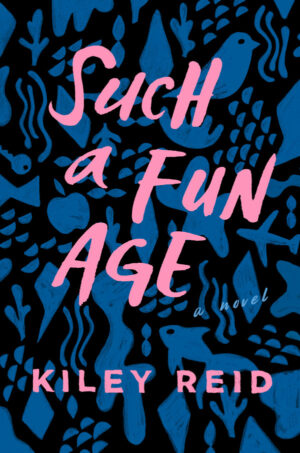Such a Fun Age
by Kiley Reid
reviewed by Chelsea Bingham
Kiley Reid’s debut novel made a splash before being released, with advance praise coming from sources as varied as Jojo Moyes and Lena Waithe, Entertainment Weekly and The New York Times. In January, Such a Fun Age was the featured title for Reese Witherspoon’s monthly book club. Covering race, class, job insecurity, and gender politics, this book has resonated with a large cross section of readers. Now, as protests against police violence and institutional racism take place all over the world, ignited by the murders of Black Americans including George Floyd, Breonna Taylor, and Ahmaud Arbery, the relevance of this book cannot be overstated. Reid has constructed a complex tale of twenty-first-century millennial life that scrutinizes racism in America today.
The novel opens in 2015, when Hillary Clinton is running for president. Alix Chamberlain is a white, older millennial woman with two children living in New York and running a business that she started at the height of the blogger era. The business, “LetHer Speak,” promotes female empowerment through letter writing. Participating in a discussion panel on reproductive care and empowering books for girls, Alix breastfeeds her two-year-old daughter throughout. She is the only female panelist, and a recording of the event goes viral. As her career begins to take off, Alix gives in to her husband Peter’s wish to move to Philadelphia, though she pretends on social media that she is still in New York City—the first indication of her intense concern with how she appears to others. Needing a new babysitter, Alix logs on to sittercity.com and chooses a profile with no picture. “Huh,” she thinks, when Emira Tucker shows up on her doorstep: Emira is Black.
Soon after Emira begins working for the Chamberlains, Alix calls her late at night with an offer to pay her double if she can come get her daughter Briar and keep her busy at a nearby grocery store. She omits to mention the reason for this request: the Chamberlains’ house has been vandalized after Peter, a news anchor, made a racist comment on air, and they want Briar out of the way while they talk to the police. After explaining that she’s at a club for a friend’s birthday, Emira decides it’s worth the extra money to make the trek. “Oh god … does she know what Peter said?” Alix wonders, as soon as Emira arrives at her house. Ashamed of her previous thoughtlessness, she resolves to “wake the fuck up. [ … ] To get to know Emira Tucker.”
While Alix is making this resolution, Emira is dancing with Briar to Whitney Houston in the grocery store. A security guard approaches Emira and asks, “Is this your child?” The guard goes on to accuse her of having kidnapped Briar, backed up by a middle-aged woman who says, “I’m a mom. And I heard the little girl say that she’s not with her mom, and since it’s so late I got a little nervous.” The security guard refuses to speak to Emira and asks Briar questions instead, repeatedly deferring to a white three-year-old child over a Black twenty-five-year-old adult. A young white man films the encounter on his cell phone and waits for Emira outside the grocery store. When he recommends she send it to a local news station, or try to get the security guard fired, she tells him to delete the video. He agrees to do so, but convinces her to let him email it to her first, a decision that has unforeseen consequences for everyone involved.
The grocery store incident reinforces Alix’s resolve to get to know her nanny, but for Emira it’s just another sign that she needs a real job, one that provides health care and paid vacation. Alix’s attempts to befriend Emira to assuage her white guilt meet with little success: beyond a shared love for Briar, the two women have nothing in common. Reid alternates chapters describing Alix’s and Emira’s day-to-day lives as Emira continues to work for the family and as they navigate the fallout from the grocery store incident. For Emira, that means putting the incident in the past and moving on with her life, while Alix obsesses over how things could have gone differently and tries desperately to find out what Emira thinks of her, even going so far as to look at the younger woman’s phone. For Alix, Emira is a mirror in which she hopes to see herself as the progressive, feminist woman that readers of her blog believe her to be. The novel’s plot is catalyzed by overt racism, but a stronger presence is Reid’s nuanced exploration of microaggressions, unconscious bias, and ignorance, carried out most often in the novel by educated white people who believe they have good intentions.
Reid has a light touch, and she excels at using small details to convey character: the woman who papier-mâchés the toilet seat with toilet paper at the airport, lugging Vera Bradley luggage and clad in Lilly Pulitzer; the house guest who brings a gift of not one but two pairs of what she hopes will become her host’s “good scissors”; the twenty-something who announces that she’s going to take a nap on the club floor. With its memorable characters and sharp portrayal of millennial life, the novel feels in some ways like it was written for the screen. But the novel is also filled with complicated ideas. Reid’s straightforward prose and sharp eye for social satire allow her to demonstrate clearly how race and privilege are inseparable from the way we structure our sense of self and our relationships with others. Such a Fun Age deserves a place on every reading list this summer.
Published on August 4, 2020

